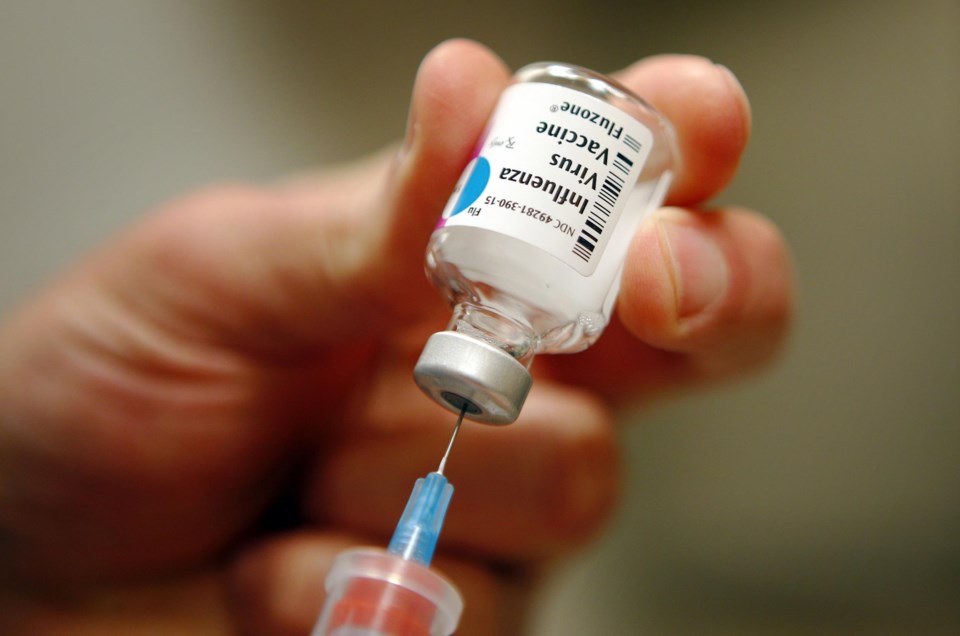The Ministry of Health and health regions across the province, including the Sun Country Health Region, are gearing up for their 2016 Influenza Clinics. The full schedule, including dates, times and locations of the flu clinics, is anticipated to be available this week. Flu clinics will begin on October 31.
Influenza is a disease caused by an influenza virus which is easily spread through coughing, sneezing and direct contact with nose and throat secretions. Influenza can result in hospitalization and death, especially in very young children, the elderly and those with serious underlying health conditions.
Symptoms of influenza include sudden onset of fever and chills, a cough, muscle aches, a headache, fatigue and a runny or stuffy nose. Infected people can spread the virus on to others before they show any symptoms.
The Influenza Immunization Awareness Campaign takes place each fall to encourage Canadians of all ages to get immunized against seasonal influenza.
The vaccine is highly recommended for people with a chronic health condition including: lung and/or heart diseases; asthma; diabetes mellitus (types 1 and 2); neurological conditions; cancer; kidney disease; persons with severe obesity; children on long term aspirin therapy; adults 65 years of age and older; pregnant women in all trimesters; residents of a long-term care facility; and children from six months up to and including 59 months of age (under five years old).
Others who are recommended to get vaccinated include: health care workers and volunteers; household and close contacts of persons who are at risk of getting seriously ill with influenza; household and close contacts of babies younger than six months of age; members of households expecting babies; individuals providing regular childcare to children up to 59 months of age (under five years old) either in or out of the home; persons who work with poultry or hogs; and health sciences students (human and animal).
The free injectable influenza vaccine will be available through public health clinics across the province, at some physician and Nurse Practitioner offices, and from participating pharmacies starting October 31, 2016.
Pharmacists can only immunize adults and children nine years of age and older with a valid Saskatchewan health card. Children under nine will need to be vaccinated at a public health clinic.
One of the most important things that a person can do to protect their own health, and the health of their children and other people in their lives, is to be immunized.
Immunizations prevent diseases for which there is often no medical treatment. These illnesses can result in serious complications and even death.
The good news is that the majority of Canadians have been immunized. Unfortunately, however, there are still some children and adults who are not immunized or who are not up-to-date with their immunizations. Not only are these individuals at risk of getting one of these diseases, but they can spread the disease to other individuals around them who are more susceptible to diseases.
Individuals who may be more susceptible to disease include the elderly, pregnant women, newborn babies and individuals whose immune systems are weak.
The more people who are immunized in a community the less likely it is for an outbreak of disease to occur. The decrease of communicable diseases in Canada through the years is in large part a result of widespread immunization throughout the population.
A Saskatchewan proposal “Strengthening Saskatchewan’s Immunization Program — Boosting the Health of Saskatchewan Children” has been sent to the Public Health Agency of Canada. This proposal represents the first phase of a three-phase project to improve immunization coverage rates in Saskatchewan.
Phase one will increase the ability of Public Health staff across the province. During phase one, the program will engage immunization registry technical experts in reviewing and revising the functions of the current provincial immunization registry system (Panorama) to better support front line Public Health staff across all Saskatchewan Regional Health Authorities and First Nations Jurisdictions.
It will also enhance the capabilities of Panorama and enable health care practitioners to better identify who the under and un-immunized population is, and better understand what barriers they are experiencing in accessing immunization services.
Phase two will build off of the data available through the successes of phase one to initiate the development of pilot projects for targeted approaches to reduce barriers to accessing immunization services. Phase three will spread successful strategies from phase two across the province. Evaluation will be a key component of each phase to ensure strong data and sustainable strategies.




